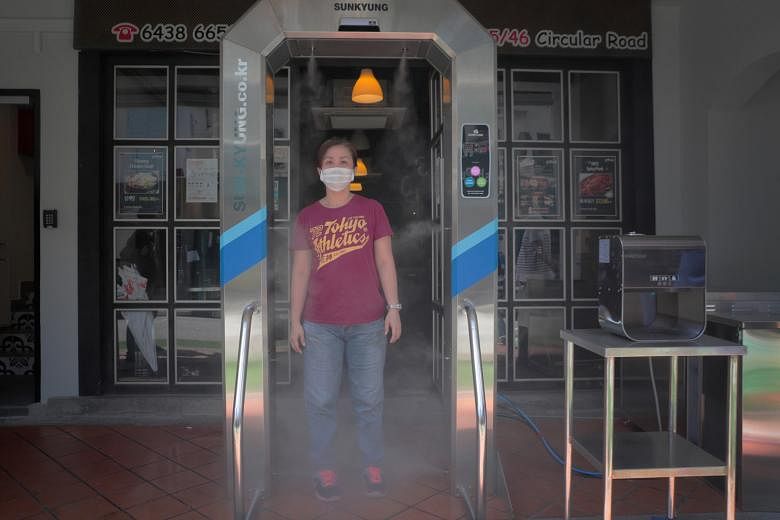Experts have warned against the use of disinfection tunnels that many countries, including Singapore, are setting up to spray disinfectant on people as they enter certain premises.
The idea is for people to walk through these tunnels or chambers and be disinfected to reduce the risk of them spreading Covid-19.
However, experts say these tunnels not only do not help curb the spread of the virus, but could harm the people using them.
A report in the British-based Occupational Medicine journal warned: "A chemical may be safe when applied topically in liquid form, but extremely toxic when atomised and inhaled."
The report, which was on a range of nine disinfectants commonly used in such tunnels, said: "Direct aerosol contact with the cornea can cause irritation and irreversible damage. Skin irritation and damage are also common."
It added that the aerosolised particles are easily inhaled into the lungs and "can react with the mucosal lining (such as the inner lining of the mouth and nose), causing irritation, swelling and ulceration in the respiratory tract. Some chemicals can be absorbed through the mucosa into the bloodstream and affect distant organ systems, for example, (the) central nervous system and gastrointestinal tract".
If ultraviolet radiation is used - a 15-minute exposure is needed to kill the virus - it "can cause damage to the eye and skin, and is a known cause of skin cancer".
Furthermore, clothes that have been sprayed on result in prolonged skin exposure "until and unless the contaminated clothing is removed, and the skin thoroughly irrigated".
Dr Kristen Coleman of Duke-NUS Medical School said that while she can appreciate the efforts to design innovative methods to safeguard the public against Covid-19, "human disinfection chambers are not the answer as they pose extreme health and safety risks".
The expert in bioaerosol research added: "Chemical disinfectants are designed to deactivate micro-organisms outside of the human body, but the disinfectants are toxic to humans if not used properly.
"Exposure to a surrounding mist of chemical disinfectants through direct contact and inhalation can cause damage to the skin, eyes and respiratory system."
Two companies providing such tunnels in Singapore have said they use non-toxic disinfectants which are safe for people.
One uses food-grade ethyl alcohol and isopropyl alcohol. Both alcohols are safe as hand sanitisers, said the World Health Organisation.
But they are known irritants when inhaled or with prolonged exposure. They irritate the eyes, nose, throat and upper respiratory tract, and can cause drowsiness, dizziness, headaches and dry skin.
Professor Dale Fisher, a senior infectious diseases consultant at the National University Hospital, said there is no evidence that such walk-through tunnels are effective.
Even if they do disinfect clothes and skin, they would not prevent someone who has Covid-19 from spreading the disease once he has gone into the building.
Prof Fisher said the virus is inside an infected person, rather than on the clothes he wears. "The virus does not waft along the street contaminating clothes."
He added: "No one has exposed humans or animals to disinfectants designed for environmental cleaning over the longer term."
He cautioned that exposure to such disinfection several times a day for months may give rise to potentially inflammatory conditions and cancers.
Dr Brenda Ang, who chairs Tan Tock Seng Hospital's infection control committee, agreed, as did Associate Professor Hsu Liyang of the National University of Singapore's Saw Swee Hock School of Public Health.
Prof Hsu said a high dose of disinfectant can be an irritant and cause discomfort, adding: "These disinfectant tunnels are more for public confidence and have limited, if any, actual utility."














